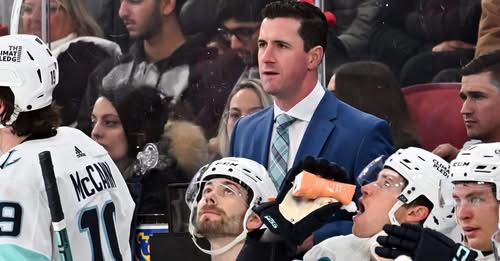The Edmonton Oilers have made a significant move to enhance their coaching staff in preparation for the 2025-26 NHL season by bringing in three highly regarded hockey minds: Paul McFarland, Peter Aubry, and Conor Allen. This strategic decision underscores the organization’s commitment to building a championship-caliber team and developing players at every level. As the Oilers continue to navigate the highly competitive Western Conference, these coaching additions aim to provide fresh perspectives, advanced tactical knowledge, and an elevated developmental approach that could very well become the difference-maker in the team’s pursuit of Stanley Cup success.
Paul McFarland arrives with a wealth of coaching experience and a strong reputation for player development. His resume includes multiple successful stints as a head coach in the American Hockey League (AHL), where he led teams to deep playoff runs and helped groom NHL-ready talent. McFarland’s approach is defined by his emphasis on a structured defensive game combined with quick, transitional offense—a style that aligns well with Edmonton’s current roster, which features elite forwards capable of explosive scoring alongside a defense corps seeking greater cohesion and consistency. His ability to connect with young players and foster their growth has been noted repeatedly, making him an excellent fit for a team eager to develop its pipeline of prospects while maximizing the potential of its current stars.
Peter Aubry brings a slightly different but equally valuable perspective to the Oilers coaching mix. Known primarily for his work behind the bench in various junior and minor league programs, Aubry is lauded for his focus on skill development, positioning, and modern defensive strategies. His expertise lies in creating a system that emphasizes puck possession, responsible play without the puck, and aggressive forechecking—elements that are critical in today’s NHL where pace and puck control often dictate outcomes. Aubry’s experience with younger players also complements McFarland’s, providing the Oilers with a dual approach to coaching that covers both tactical instruction and individual skill enhancement.
Conor Allen’s addition is particularly interesting given his background as a former defenseman who transitioned into coaching and player development roles shortly after retiring as a player. His hands-on knowledge of the defensive aspects of the game, combined with a growing reputation as a skilled communicator and strategist, positions him as a valuable asset for Edmonton’s blue line. Allen has worked extensively on defensive systems, penalty killing units, and special teams, areas where the Oilers have been looking to improve in recent seasons. His fresh ideas and contemporary approach to defensive play will likely challenge and motivate the current roster to elevate their game in critical moments.
Together, these three new coaches add a broad spectrum of expertise that enhances Edmonton’s overall coaching philosophy. The Oilers’ front office has been clear in its vision of blending veteran leadership with youth movement, and this reshaped coaching staff embodies that balance. With a blend of analytical insight, player development skills, and tactical innovation, McFarland, Aubry, and Allen are expected to work closely with head coach Jay Woodcroft to refine the team’s systems, sharpen their in-game adjustments, and ensure that player progression remains a priority throughout the season.
The decision to strengthen the coaching ranks comes at a pivotal moment for the Oilers. Despite the immense talent on their roster, including franchise cornerstones Connor McDavid and Leon Draisaitl, Edmonton has faced challenges in translating skill into consistent playoff success. The 2024-25 season showcased flashes of brilliance but also highlighted areas needing improvement, particularly in defensive structure and special teams execution. By bringing in these new voices, the Oilers aim to address those shortcomings through targeted coaching interventions and a renewed emphasis on accountability and detail.
Paul McFarland’s coaching pedigree is impressive. Having served as head coach of the Toronto Marlies in the AHL, he developed a reputation for blending discipline with creativity. McFarland’s teams are known for their relentless work ethic and ability to execute complex game plans under pressure. His coaching style is built on communication and relationship-building, enabling him to foster trust and confidence among players. This is especially important in Edmonton, where the young roster must balance individual skill with a collective commitment to team defense and structure.
Peter Aubry’s background is equally compelling. He has spent considerable time working with junior teams, where nurturing raw talent and instilling professional habits are essential. Aubry’s commitment to developing a high hockey IQ in his players is something the Oilers organization values highly. His coaching approach centers around teaching players to think the game at a faster pace, make smarter decisions with and without the puck, and embrace a two-way style of play. This emphasis aligns well with the evolving nature of the NHL, where versatility and adaptability are key traits for success.
Conor Allen’s transition from player to coach has been seamless. After a solid career as a defenseman in both the NHL and AHL, he quickly moved into coaching and player development, earning praise for his analytical mind and ability to break down game situations in detail. Allen has a knack for translating complex defensive concepts into actionable advice that players can apply in real time. This skill set will be particularly valuable in helping the Oilers tighten their defensive zone coverage and improve their penalty kill, both areas that have cost them in critical moments in recent playoff campaigns.
The synergy expected from this new coaching trio could prove transformative. As they integrate into the Oilers’ existing structure, they will be tasked with collaborating closely not only with the players but also with the broader staff, including trainers, analytics teams, and scouting personnel. Their collective goal is to create an environment where players feel supported yet challenged, where feedback is constructive and constant, and where every practice and game situation is leveraged as a learning opportunity.
Furthermore, the Oilers’ investment in these coaches signals an organizational commitment to long-term success rather than short-term fixes. By focusing on development and system refinement now, Edmonton is positioning itself to remain competitive in a league that is constantly evolving. The NHL’s current landscape demands adaptability and forward thinking, and these hires suggest that the Oilers are intent on meeting those demands head-on.
For fans and analysts alike, the announcement of Paul McFarland, Peter Aubry, and Conor Allen joining the Oilers coaching staff offers a sense of optimism. There is a recognition that coaching in the NHL is as much about relationships and culture-building as it is about strategy. With these additions, Edmonton is not only gaining tactical expertise but also individuals who can mentor young stars and help foster a resilient team identity.
In the broader context of the NHL coaching market, the Oilers’ moves reflect a trend toward embracing coaches with strong developmental backgrounds and modern tactical approaches. The league is increasingly valuing coaches who can innovate, adapt, and manage diverse personalities within their locker rooms. McFarland, Aubry, and Allen fit this mold perfectly, each bringing complementary strengths that address different facets of the game.
As the 2025-26 season approaches, much attention will be paid to how these coaches integrate their philosophies with the existing team dynamics. Early reports from training camp and preseason will be scrutinized for signs of system changes, shifts in player roles, and improvements in overall team execution. The Oilers’ management has expressed confidence that these new hires will quickly make a positive impact, helping the team avoid past pitfalls and push deeper into the playoffs.
In summary, Edmonton’s decision to bolster their coaching ranks with Paul McFarland, Peter Aubry, and Conor Allen is a clear statement of intent. It reveals a multi-faceted strategy focused on developing talent, enhancing tactical execution, and building a culture of accountability and continuous improvement. These coaches bring distinct but complementary skill sets that address key areas where the Oilers have sought growth—defense, special teams, and player development.
This new coaching trio’s arrival sets the stage for what could be a pivotal season in Edmonton’s quest for a Stanley Cup. With McDavid and Draisaitl leading the charge on the ice, the addition of McFarland, Aubry, and Allen behind the bench ensures that the supporting cast and team systems are better prepared than ever to capitalize on their superstar talents. Fans can look forward to a more cohesive, well-coached Oilers squad, one that balances explosive offense with responsible, structured play.
Ultimately, these changes represent the Oilers’ commitment to not only contending in the present but also building a sustainable foundation for success in the years to come. The 2025-26 season could very well mark the beginning of a new chapter in Edmonton’s storied franchise history—one defined by smart coaching, player development, and a relentless pursuit of excellence. With Paul McFarland, Peter Aubry, and Conor Allen now on board, the Oilers have taken a decisive step toward making that vision a reality.



